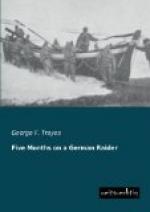The same afternoon we walked back to the beach to see if we could go aboard the stranded ship to retrieve our luggage, but the sea was far too rough to allow of this, and the German and Spanish crew had not been taken off. While on the beach we saw two floating mines exploded by a Danish gunboat. We had not only had a narrow escape from the Germans, but also from the dangers of a minefield. The next day was also too rough for us to go aboard; in fact, it was so rough that the lifeboat went out and took everybody off the ship, both Spanish and German. The Spanish first mate was thus saved, and after all did not serve his sentence in Germany. We congratulated him once more on his lucky escape. He had escaped even more than we had. It was reported that a German submarine appeared to take off the German officers on this day, but as it was too rough to lower the boats this could not be contrived.
The Igotz Mendi was now deserted, but as the Danish authorities had adjudged her, twenty-four hours after her stranding, to be a Spanish ship, she had reverted to her original owners. Accordingly, before leaving her the Spanish Captain had hoisted the Spanish flag at her stern, the first time that or any other flag had appeared there since that November morning when the Germans had captured her far away in the Indian Ocean. She was no longer a German prize. She would have been the only one the Wolf had secured to take home—a neutral ship with only a few tons of coal on board, and a few married couples, and sick and elderly men as prisoners—not much to show for a fifteen months’ cruise; and even that small prey was denied the Germans, though the Wolf had certainly carried home a valuable cargo and some hundreds of prisoners, besides doing considerable damage to the shipping of the Allies.
The position of the stranded ship was a unique one. She was a neutral ship, a German prize, stranded in neutral waters, with a crew composed of Germans and neutral prisoners, and carrying twenty passenger prisoners of many enemy nationalities—English, Australian, American, Japanese, Chinese, and Indian; of these fifteen were European, and in the company were nine women and two children.




